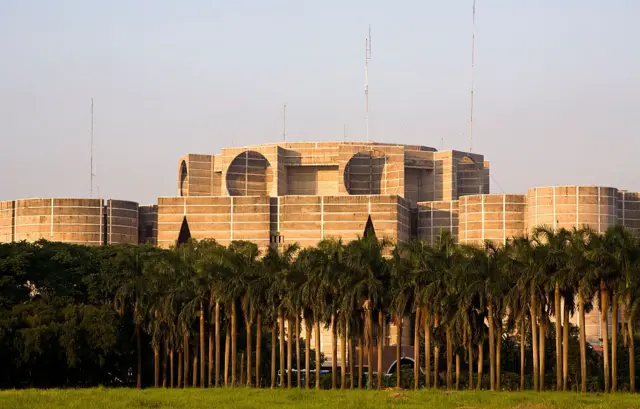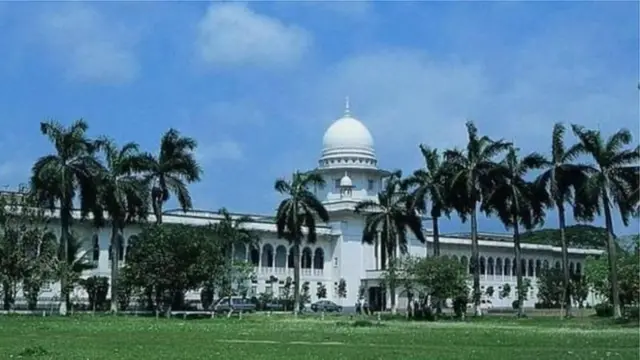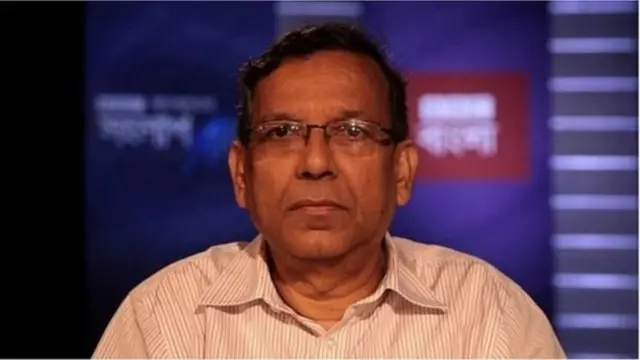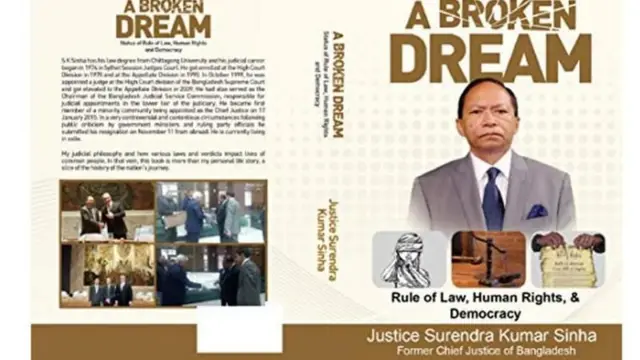The Sixteenth Amendment to the Constitution was brought in 2014, returning the power to remove judges to the National Parliament. Later, when it reached the courts, first the High Court and then the Appellate Division ruled that the amendment was invalid.
Due to some observations made in that judgment , tension arose between the government and the Chief Justice. Later, the then Chief Justice SK Sinha sent his retirement letter from Singapore while on leave.
Later, in a book written from abroad, he claimed that after the verdict, he was ‘forced to leave the country under pressure from the government’ . However , Awami League leaders claimed that his claims were ‘fabricated’.
The hearing of the government’s petition seeking review of the judgment given by the Appellate Division in 2017 will be heard on July 11.
This amendment and judgment regarding the removal of high court judges created a lot of drama in the political and legal arena of Bangladesh at that time.

IMAGE SOURCE,GETTY IMAGES
Context of the Sixteenth Amendment of the Constitution
In the first constitution of Bangladesh, the power to remove judges was in the hands of Parliament.
When the President-ruled system of government was introduced in 1975, the power to remove judges was removed from Parliament and transferred to the President through the Fourth Amendment.
But later, during the regime of President Ziaur Rahman, the power was given to the Supreme Judicial Council by bringing the fifth amendment to the constitution. The head of which will be the Chief Justice.
Awami League amended the constitution again in 2014 on how to remove a high court judge if he violates the constitution or is accused of misconduct.
Then in this sixteenth amendment it is said that the power to remove the judges will be in the hands of the National Parliament. The government published the gazette in September of that year after the bill was passed in the parliament.
BNP, the biggest opposition party in Bangladesh at that time, strongly opposed this amendment of the constitution, along with various political parties and lawyers’ organizations.
They alleged at the time that the government was trying to establish political control over the judiciary.
Although Law Minister Anisul Haque told BBC Bangla at the time that the power to impeach judges is in the hands of Parliament, they can remove a judge if they do not like the verdict, but that is not the case.
There must be specific allegations of misconduct and incompetence against the judge. And this complaint will be verified by a separate independent body. So there is no opportunity to misuse this power, Mr. claimed then. the right

What happened in the High Court
Later in November 2014, nine lawyers challenged the amendment in the High Court.
On November 9, the High Court issued a ruling to the government seeking to know why the Sixteenth Amendment, which returned the power to remove judges to the hands of the National Assembly, should not be repealed.
A special and largest bench of three judges of the High Court was constituted to hear this rule.
Five senior advocates appeared before the court as amicus curiae in the hearing of this writ.
These are Dr. Kamal Hossain, Barrister M Ameer Ul Islam, Barrister Rokan Uddin Mahmud, Ajmalul Hossain KC and Prabir Niyogi.
On May 5, 2016, this special bench, by a majority, declared the Sixteenth Amendment invalid and unconstitutional.
Two of the three judges voted in favor of declaring the amendment invalid. Another justice ruled in favor of the Sixteenth Amendment.
The full judgment was published on the Supreme Court’s website on August 11 of that year.
Appellate Division Govt
In January 2017, the state filed an appeal against the judgment of the High Court. The following month, the Appellate Division appointed ten lawyers as amicus curiae to hear the views of senior lawyers in the case.
Amicus curiae are those who help the court by interpreting and analyzing various complex legal issues.
Nine of these ten amicus curiae stated that Parliament should not have the power to remove judges. Only Ajmalul Hossain KC was in favor of keeping this power in the hands of the National Assembly.
The appeal hearing began on May 8. The case was heard in the Appellate Division for eleven days.
Later, on July 3 of the same year, an appellate bench of seven judges, including the then Chief Justice Surendra Kumar Sinha, declared the Sixteenth Amendment invalid and upheld the judgment of the High Court.
The then Attorney General Mahbubey Alam expressed his disappointment in the Supreme Court’s verdict.
He said, “The issue of this Supreme Judicial Council was only Pakistan and our country was joined by the military government during Ziaur Rahman’s regime and unjustly amended the constitution.” We want to remove from the constitution what the military rulers did”.
After the verdict, the petitioners’ lawyer Manzil Morshed expressed his satisfaction.
Later on August 1, the Supreme Court announced the full verdict.

Dissatisfaction with judgments and observations
Seven judges gave this verdict based on consensus. The full 799-page judgment caused intense dissatisfaction among the government.
Because the then Chief Justice SK Sinha wrote the part of his observation in the judgment, criticizing various issues including the liberation war, country’s politics, democracy, military rule, election commission, corruption, good governance and independence of judiciary.
Mr. Bangabandhu Sheikh Mujibur Rahman has been ‘belittled’ in this observation. Ministers of ruling party Awami League, many leaders-activists and lawyers demanded Sinha’s resignation. The then Chief Justice SK Sinhar was also criticized in the National Parliament.
Prime Minister Sheikh Hasina also Mr. Sinhar criticized. On the other hand, BNP welcomed this verdict.
The differences between the Chief Justice and the government became evident around this verdict.
Law Minister Anisul Haque held a press conference in Dhaka ten days after the release of the full verdict.
At that time Law Minister Anisul Haque was saying that there were many irrelevant and political statements in the verdict. They will deal with it legally. They said that they respected the verdict even if they disagreed.
The law minister commented that political questions cannot be a matter for the court.
He said, “Hon’ble Chief Justice has insulted the Jatiya Sangsad in the judgment and denigrated this institution. We are sorry for this statement. He mentioned in another place in the judgment that the independence of Bangladesh was not due to a single person. I am shocked by his statement.”
The observations in this judgment of the Appellate Division have angered the government more.
Article 116 of the Constitution places the matter of discipline or code of conduct of lower court judges in the hands of the President.
The government has sought time from the Appellate Division on the question of making a code of conduct to fully transfer this responsibility to the Supreme Court. The Law Minister termed the Appellate Division’s observations on this paragraph as ‘abhorrent’.
Government’s decision to review the verdict
Following the judgment of the Appellate Division, a motion was passed in Parliament on 13 September, calling for legal action against the judgment.
Later, in December of the same year, the state filed an application seeking review of the Supreme Court’s verdict.

Defection and resignation of SK Sinha
In the context of making sharp differences with the government, Mr. Sinha. Later he left the country on October 13th night.
The Chief Justice submitted his resignation to the Bangladesh High Commission in Singapore on November 11 .
The next year “A Broken Dream: Rule of Law, Human Rights and Democracy” Mr. Sinha published an autobiographical book.
In this book Mr. Sinha describes in detail how his conflict with the government arose and how he was forced to leave the country, then why he was forced to resign as Chief Justice.
He claimed that he left the country in the face of threats and intimidation by Bangladesh’s military intelligence agency DGFI.
Justice Sinha wrote, “Pressure was created from the highest echelons of the government so that the verdict of repealing the sixteenth amendment of the constitution of Bangladesh should go in favor of the government.”
In this book Mr. Sinha wrote, “I was hoping that my direct absence and the regular vacation of the court would help normalize the situation and bring about the emergence of good sense, that the government would understand the gist of the judgment – that the independence of the judiciary is good for the nation and the state.” .
“Finally, I submitted my resignation from abroad after facing intimidation by the country’s military intelligence agency – the Directorate General of Forces Intelligence – and threats to my family,” wrote Mr. Sinha.
Awami League general secretary Obaidul Quader replied , “Justice SK Sinha has written a book and is talking nonsense because of the anger of losing power.” When there is no one in power, there is a lot of internal pain. Many people talk a lot from this internal combustion.”
“We don’t think there is any need to talk about those who sit abroad who talk like this”, said the general secretary of Awami League.
“Why a judge does not have the courage to say what he is saying in the book when he is the Chief Justice – it is a question of ethics,” said Mr. whose
The arguments on which the review petition of the Govt
Mr. Ray’s observations. Sinha wrote ‘Founding Fathers’ in place of the father of the nation i.e. plural. The state has applied for reconsideration of this matter. They mentioned in the application that Bangabandhu Sheikh Mujibur Rahman is the only father of the nation of Bangladesh.
In this judgment, it has been observed that we should get rid of the concept of ‘Selfhood’ and ‘Selfhood’. The state has said in the petition seeking review of this matter, this observation of the court is baseless. That is not the issue in this case.
The state party has said in the application that it is not a matter for the court to review the observations made on the election process of Bangladesh. The High Court went beyond judicial etiquette and made this observation.
The state side argued in the review petition regarding the monitoring of parliamentary democracy, saying that the court made these comments outside the judicial jurisdiction.
Attorney General AM Amin Uddin expressed hope that the Supreme Court will reconsider the verdict.
“We will present our arguments in court in favor of the grounds on which we have sought review. We hope to get positive results,” said Mr. Uddin
However, like the judgment of the High Court and the Appellate Division, the previous judgment is expected to be upheld in the review application, Manzil Morsed, the lawyer of the petitioners.
“Earlier we have won in High Court and Appellate Division as well. As a result, we hope that the verdict will come in our favor at the last stage of the review,” said Mr. Morshed.